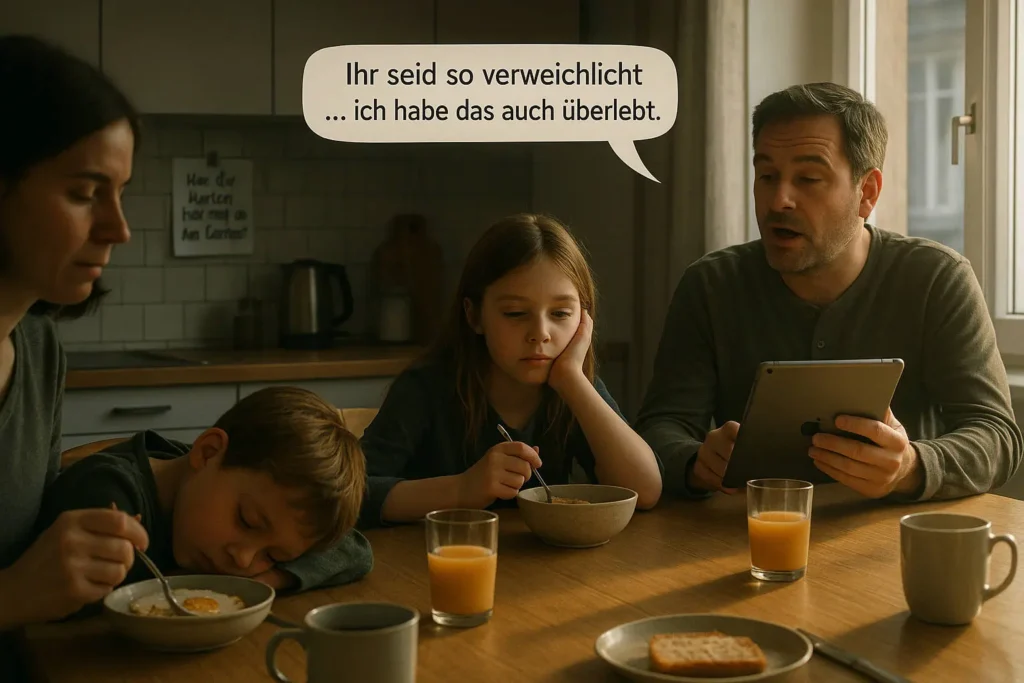"Refreshing and interesting presentation of the topic of chronobiology. Helpful and useful information for both professional and private life and actions was presented in a…

"We survived it too" - Why survivorship bias is making our children ill
It’s one of those phrases that everyone has probably heard before:
“We survived it too.”
Whether it’s about getting up early, tough exams or the legendary “school of life” – this phrase is used as a kind of seal of approval to block any discussion about necessary changes in the education system. “Peace of not knowing – that’s what they call a phenomenon!”
But this is precisely the problem: survival is not a measure of health.
The survivorship bias in education
Survivorship bias describes a primitive thought pattern that aims to undermine other perspectives: We only see those who have “made it” and ignore the invisible consequences. We also evade a definition of “survival”.
It’s a certain type of adult who talks about their school experiences – and who believe that this is proof that it couldn’t have been that bad: “I turned into something!”
What about those who are broken by survival?
What about the students who were never able to develop their potential because they were constantly tired, overwhelmed or ill?
What about the invisible scars that only show up decades later as depression, burnout or chronic exhaustion?
They are all part of the picture – only they are systematically hidden in the “we survived” narrative.
Sleep - the invisible foundation
Of course, this is also very evident in my specialty: sleep and chronobiology.
Sleep is not a luxury, not a nice add-on for a relaxed day. Sleep is the basis of all cognitive, emotional and physical processes. Without sufficient and properly timed sleep, no body can function as nature intended. This is especially true for children, because this is where the foundations are laid for what they will later develop into.
The science is clear here:
Teenagers are biologically late types. Their body shifts melatonin production and their internal clock backwards. This has nothing to do with laziness or even unwillingness.
Starting school at 7:30 or 8:00 a.m. means that teenagers are systematically living against their biology. In some cases, they are torn from sleep in the middle of their biological sleep cycle in order to get to school on time.
Consequences: chronic lack of sleep, reduced concentration, increased susceptibility to stress, increased aggression, higher risk of depression and addictive behavior.
And yet children and young people hear: “Don’t be like that – we had to go through it too.”
The silent "not normal" message
Perhaps the most dangerous consequence of this attitude is psychological.
When children feel that their tiredness, concentration problems or emotional instability are not recognized, the effect is fatal:
They consider themselves “not normal”.
Instead of recognizing that it is their body that simply functions according to biological rules, they believe there is something wrong with them. They develop feelings of shame and self-doubt, often coupled with the pressure to “function” and encouraged by other children who adopt the style of the adults.
We are not talking about individual cases here. We are talking about an entire generation that is facing a future with exponentially increasing mental demands.
Exponentially increasing knowledge - static regeneration structures
Today, the volume of knowledge is doubling at a pace that previous generations were not even aware of. Young people must learn to
But how can this be achieved if the foundations – sleep, regeneration, ability to concentrate – are systematically undermined?
The structures of our schools are linear, rigid and equalizing. They are a relic from a time when conformity and discipline were more important than creativity and innovation.
The result: we are building a society in which we expect the next generation to perform at the highest level in an accelerating world – while systematically depriving them of the biological basis for this.
"Survival" is not enough!
It’s true: Many of my generation survived their school days. But then is not now, and for quite a few, at what cost?
Burn-out rates have been rising for years.
Mental illnesses are increasing rapidly.
Sleep disorders have long been part of “normality” in our society.
We did not emerge “healthy” from this system. We survived – yes. But we have also learned to suppress our symptoms, to see tiredness as weakness and stress as a badge of honor.
And it is precisely this attitude that we (un?)consciously pass on.
A change of perspective is overdue
The crucial question is: do we want our children to survive – or do we want them to live and develop their potential?
To achieve this, we must finally accept this:
Biology cannot be overridden by discipline.
Sleep is not a privilege, but a basic requirement for health and performance.
School and exam times that ignore how young people tick chronobiologically are a systematic attack on their development.
What to do!
Later school start times – adapted to the internal clock of young people. Incidentally, every school can decide this for itself, there is no need for politics.
Examinations at sleep-compatible times – not in the biological “dead zones”.
Destigmatizing fatigue – children need to learn that their bodies give them signals that should be taken seriously.
Educating parents and teachers – so that “We survived it too” is finally replaced by “We understood”.
The price of ignoring
If we don’t take this step, we will pay a high price: a highly digitized but exhausted generation. This is not an individual problem, it would be a structural failure.
Survivorship bias keeps us trapped in the illusion that the past automatically legitimizes the future. But what was “survived” yesterday can mean catastrophic death in life today – under completely different conditions.
This article is not an appeal for convenience, but rather an appeal to common sense:
Sleep lays the foundation for our children today for what our children will have to achieve tomorrow.
If we ignore this, we not only deprive them of the opportunity to really exploit their potential in a world that is becoming exponentially more complex, we also make ourselves partly responsible for the health consequences.
If you look back honestly – did you really get through school “healthy”? Or did you just learn to suppress your tiredness so deeply that you still think it’s normal today?
To the topic matching articles
- AOK Bavaria
- WPML test EN
asdf
- IG-Metall Schweinfurt
"Perfect for the group of participants. The lecture was thought-provoking and will play a major role in the current transformation of the world of work."…



